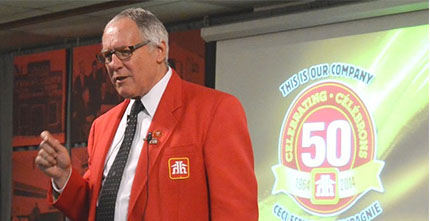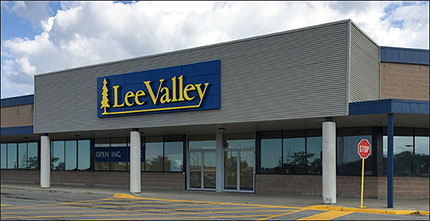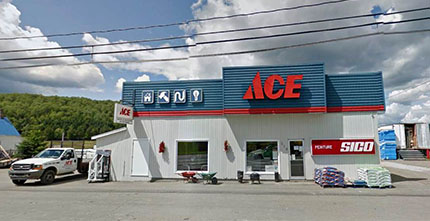May 14, 2018 Volume xxiv, #19
“By working faithfully eight hours a day you may eventually get to be boss and work twelve hours a day.”
—Robert Frost (American poet, 1874-1963)
IN THIS ISSUE:
-
Expanded role for Home Hardware CEO Terry Davis points to next steps for the co-op
-
National Hardware Show rolls out with strong attendance, upbeat mood
-
Lee Valley Tools plans largest store ever—and first in Quebec
-
Big things are happening in small stores, even as national chains keep growing
PLUS: Home Depot's Jeff Kinnaird honoured, Canadian Tire results, new Castle member, Loblaw to roll out online groceries, CanWel profits climb, JRTech to provide to more BMR stores, L’Image Home Products honoured, Costco results, Goldblatt gets a reboot, housing intentions, home prices in the GTA, and more!
 Expanded role for Home Hardware CEO Terry Davis points to next steps for the co-op
Expanded role for Home Hardware CEO Terry Davis points to next steps for the co-op

ST. JACOBS, Ont. — The announcement last week that Home Hardware chief executive Terry Davis has added the title of president to his responsibilities marks the latest step in propelling the 54-year-old company forward. While Davis has had the CEO role for the past four years, the president’s role had remained with his predecessor, Paul Straus.
Straus, who has had a reduced role at the dealer-owned home improvement co-op, is now retiring, but will remain in a counsel role to the company.
In his expanded role as both president and CEO, Davis will continue to report to Home’s board of directors, but now as president, he will also sit on the board, putting him in closer contact with the board as he executes day-to-day functions. More specifically, he is accountable for the control of the business and the general conduct and affairs of Home Hardware Stores and its wholly-owned subsidiaries. He also remains responsible for the financial control and long-term health of the company.
Davis said from the start of his tenure in the top job that his would be an interim role, and while four years might be considered a reasonable period for a CEO to stay in place, it’s brief by Home Hardware’s standards. Founded in 1964, Davis was only the third person to lead the company, following Straus and co-founder Walter Hachborn before him.
Davis joined Home Hardware more than four decades ago in a junior warehouse position at the distribution centre in St. Jacobs, Ont. He moved his way up through the ranks, taking on a series of managerial and executive positions accountable for dealer support and dealer development, marketing, information technology, dealer finance and legal services, administration, and strategic planning.
In 2010, he was appointed executive vice-president and COO, and became CEO in 2014.
 |
 |
National Hardware Show rolls out with strong attendance, upbeat mood

LAS VEGAS, Nev. — The largest hardware show in North America got off to a strong start yesterday with 2,600 vendors playing host to dealers and buyers from around the world. Canadian attendance was strong, as well, with head office buyers from Canadian Tire, RONA, Groupe BMR, Lee Valley Tools, Spancan, and more walking the aisles. The show is also proving to be a draw for an increasing number of independents.
These included dealers from Home Hardware, a number of whom were also involved in activities and workshops hosted by the North American Retail Hardware Association. The range of seminars put on by the NRHA filled all three days of the show, and featured representatives from companies such as The Grommet (an online seller that Ace Hardware has invested heavily in), Alibaba.com and Treehouse.
The NRHA kicked off the show with its Young Retailer Awards gala. A Canadian, Mike Wilson of Wilson's Home Hardware Building Centre in Barrington Passage, N.S., was among the eight winners of the awards. The fourth-generation dealer-owner joined Home Hardware in 2008. Since then, he has made changes that included adding a Home Furniture and a mobile phone store. As a result, top-line sales have increased every year since 2012.
Many of the Canadian buyers who made the trip to Las Vegas attended the annual Maple Leaf Night, held on the first night of the show by the Canadian Hardware and Housewares Manufacturers Association at the Mirage hotel. On the show floor, new products were in abundance, driven by technological advances in categories such as lighting, power tools, and even wood panelling.
Traffic continued to be healthy throughout the show, with buyers from countries as far afield as Australia, Japan, South America, and Europe.
(More on what we found at the National Hardware Show in next week's mind-boggling edition of HARDLINES!)
 |
 |
Lee Valley Tools plans largest store ever—and first in Quebec

OTTAWA — Continuing the steady expansion of its bricks-and-mortar presence, Lee Valley Tools will open its first store in the Quebec market this fall.
Robin Lee, head of Lee Valley Tools, says his company is currently working on its next store, which will be beside Autoroute 15 in Laval, Que., near Montreal. Sitting in a former Best Buy store, it will have more square footage than typical Lee Valley stores. “It’s going to be one of our largest stores,” says Robin Lee, president and CEO of the company. The large size will pose some challenges, he admits. “We’re doing a little more tweaking of the store design there.” The move to Quebec will also mean translation of all of Lee Valley’s materials into French.
One of the differences will be more emphasis on making the store more experiential. “It will have a lot of interactivity,” Lee says. It is scheduled to open in October. The product mix of a traditional Lee Valley store caters to woodworkers, hobbyists, and people searching for unique cabinet hardware, toys, and puzzles. On any given day, seminars and workshops draw customers who want to learn knife sharpening or how to make a bird house.
Despite Lee Valley’s strong presence online (it started out in 1978 with one store in Ottawa and a ground-breaking mail order catalogue), Lee has been committed to growth of the bricks-and-mortar side of the business. The last store to open was in Niagara Falls, Ont., in June 2017 (shown here).
Lee, along with the company’s founders, his parents Leonard and Lorraine Lee, were recently awarded the Excellence in Retailing Awards 2018 Lifetime Achievement Award. The award is presented by the Retail Council of Canada.
 |
 |
Big things are happening in small stores, even as national chains keep growing

SPECIAL REPORT — Big boxes might have the advantage of size, but small stores have come up with several ways to make the most of their square footage. From customer service to clever merchandising, size is secondary to how retailers use their space.
These days a more sophisticated customer has led to a more sophisticated approach to small store merchandising. “No matter what kind of market a retailer is in, customer needs and expectations have evolved, and stores have had to evolve with them,” says Bill Morrison, divisional vice president of Ace Canada. “The key is the store has to remain relevant to its local market or it won’t survive.”
The store’s core product selection also must be based on hard sales data collected over time. If the retailer wants to maximize sales per square foot, says Morrison, vital space can’t be taken up by merchandise that moves too slowly or is out of season. At the same time, retailers need to regularly augment their core product selection with interesting new products to keep the customer experience fresh. “Small can’t mean boring,” he adds.
Another function of choosing the right core products is demonstrating to customers that the store is “in that business”, says Laurie Wittie, store design manager for Home Hardware Stores Ltd., whether that be tools, plumbing, electrical, or kitchen and bath. If customers come into a smaller store looking for a certain product, they don’t expect to see multiple brands and lines of the same product several tiers deep like they would in a big box store.
“As long as the store has a couple of options to choose from—good, better, best if possible—the customer knows they can fill their need for that particular product at that store,” Wittie says. “If they’re looking for more options, at least the retailer can start a conversation and perhaps get what the customer wants on special order.”
That’s an approach to merchandising that Yves Lebel uses in his 2,500-square-foot BMR hardware store in the small town of Saint-Anne-de-Madawaska, N.B. With a much bigger RONA dealer about 15 minutes away in Edmundston and a Kent building supply store the same distance away in Grand Falls, it’s essential that Lebel display as many different products as possible.
“Big stores have way more space than we do, but it’s just lots and lots of the same stuff,” says Lebel. “Instead of 10 of an item on the shelf, we might have two or three and store the overstock in the warehouse. We can’t take up space in the store with too much inventory; it’s more important that our customers know that we have all the products they might need.”
(This is an excerpt of a larger feature that appears in the current edition of our sister publication, Hardlines Home Improvement Quarterly. HHIQ is mailed to 11,000 dealers, owners, and managers. Click here to get your own subscription today!)
 |
DID YOU KNOW…?
... that you can get updates through the week with our free Daily News? That’s right: this free service provides ongoing updates on home improvement and retailing news in general. Sign up now for this no-charge service from Hardlines! (Did we mention that it’s free?)!
 |
 |
RETAILER NEWS
TORONTO — Canadian Tire said its Q1 profits declined from a year ago, coming in at $78 million compared to 87.5 million in the first quarter of 2017. Total revenues for the quarter rose by 3.3% to $2.81 billion, compared to $2.72 billion a year ago. Same-store sales saw an increase of 5.2%. The company also announced it has inked an agreement to buy Norwegian sportswear and workware manufacturer Helly Hansen. The deal, expected to close in Q3, will see Canadian Tire take on Helly Hansen’s $50 million debt, while CEO Paul Stoneham and the Oslo-based management team will remain in place.
MISSISSAUGA, Ont. — Castle Building Centres’ newest member is North Dundas Building Supplies. Located midway between Ottawa and Morrisburg, Ont., it will service the lumber and building material needs of the surrounding communities, including Chesterville and Winchester. New owners David Nyentap and Stacy Duguay from Russell, Ont., recently purchased this former lumberyard location and intend to return it to its original retail roots, adding a new storefront design.
BRAMPTON, Ont. — Loblaw Companies plans a national roll-out of its online grocery business this year. That will include the rapid expansion of PC Express pick-up sites and the option of home delivery. PC Express will be introduced to 500 new pick-up sites, bringing the total to more than 700, including more grocery stores, GO Train commuter stations, and the first of many Shoppers Drug Mart stores. Home delivery is currently offered in 11 major markets (including Toronto, Vancouver, and Calgary) through Instacart, with five to follow this year (including Montreal, Halifax, and Regina).
ISSAQUAH, Wash. — Costco Wholesale Corp. reported net sales of $10.81 billion for April, an increase of 13.1% from $9.56 billion last year. For the 35-week year to date, the company reported net sales of $92.24 billion, up 12.2% percent from $82.24 billion last year.
SUPPLIER NEWS
MONTREAL — L’Image Home Products has earned the 2018 Energy Star Award for Excellence. The award was given to L’Image for its efforts to promote the Energy Star brand and to educate consumers about the benefits of energy efficiency. The award is given by the U.S. Environmental Protection Agency and the U.S. Department of Energy. Shortly after getting this award, L’Image won the Canadian version of the award, sponsored by Natural Resources Canada. It won in the category of Manufacturer of the Year.
VANCOUVER — CanWel Building Materials Group Ltd. has reported that first-quarter consolidated revenues increased by 32.4% to $295.0 million, versus $222.8 million in the same period in 2017. Sales for the distribution segment increased by $74.4 million or 35.9%, largely due to the inclusion of the results from the Honsador Acquisition, an upward trend in construction material pricing, and the company’s stated focus on product mix strategies and its target customer base. Net earnings for the quarter were $6.5 million, an increase of $4.8 million or 289.3%.
BOUCHERVILLE, Que. — JRTech Solutions Inc., the Canadian reseller of Pricer digital price tags, is rolling out the electronic label technology in 20 more BMR stores. Installations are planned for 2018 with a total order value of $2.2 million. This brings the number of BMR stores using the technology to 40. Another 20 stores are expected to take on the electronic tags in 2019, as well, says Pricer. JRTech has been involved in more than 400 store installations with Pricer technology since 2009.
ST. LOUIS, MO — Net Q2 revenues for Energizer Holdings were $7.8 million, or $0.13 per diluted share, compared to $46.9 million ($0.75) in the second quarter of last year. Sales rose 4.3% to $3.74 million, boosted by favourable currency movements. The quarter also saw the battery manufacturer move closer to closing its announced acquisition of Spectrum Brands, clearing regulatory milestones in the U.S., New Zealand, and Colombia.
SADDLE BROOK, N.J. — Hangzhou GreatStar Industrial Company, through its tool division Arrow Fastener, is relaunching the Pony and Jorgensen adjustable clamping brands and Goldblatt tile, drywall, concrete, and masonry tools. The lines will be introduced to the North American marketplace in mid-2018. GreatStar, based in Hangzhou, China, is a hand tool manufacturer in Asia specializing in the design and manufacture of products for DIY, professional, and industrial markets globally. Arrow Fastener is a manufacturer of staple guns and heavy duty staples. Its New Jersey facility will become a primary distribution centre for Pony, Jorgensen, and Goldblatt products.
PEOPLE ON THE MOVE
Jeff Kinnaird, president of Home Depot Canada, has been recognized for a lifetime of achievement by the Retail Council of Canada (RCC). Kinnaird and his team have garnered the Excellence in Retailing Awards 2018 Distinguished Canadian Retailer of the Year Award. The Distinguished Canadian Retailer of the Year Award recognizes a retail leader who has led their company to outstanding business success and innovation and has consistently demonstrated community commitment and support. The recipient is a role model because of their leadership within the corporation, in the retail industry in Canada, and in the community at large, through personal and/or corporate philanthropic activities. The Excellence in Retailing Awards Gala will close the first day of RCC’s conference, STORE 2018, May 29 to 30. For more information and to purchase tickets, click here.
Lixil Canada Inc., home to such kitchen and bath brands as American Standard and GROHE, has named Valerie Malone as president and general manager. In her new role, Malone will be responsible for Lixil’s business strategy and growth in the trade, retail, and e-commerce channels, working with the international Lixil team. A graduate of the University of New Brunswick in finance, Malone joined Lixil a year ago.
ECONOMIC INDICATORS
The value of building permits increased 3.1% to $8.4 billion in March, following a 2.8% decline in February. The rise was mainly the result of higher construction intentions for multi-family dwellings, particularly in Quebec and British Columbia, and, to a lesser extent, by the commercial component. Residential building permits were up 2.3% in March, with multi-family permits up 12.2%, and intentions for single-family dwellings down 7.9%. The value of building permits for non-residential structures rose 4.5% to $3.0 billion in March, after a 6.4% decline in February. (StatCan)
NOTED
The impact of all government fees, taxes, and charges on new home prices in the Greater Toronto Area has increased significantly, according to a new report conducted by the Altus Group for the Building Industry and Land Development Association (BILD). The report shows these costs add $186,000 to the price of an average new single-family home and $121,000 to the cost of an average high-rise apartment in the GTA.


